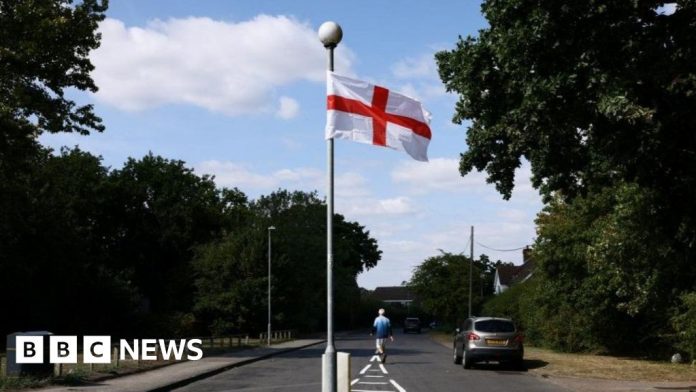Midlands correspondent
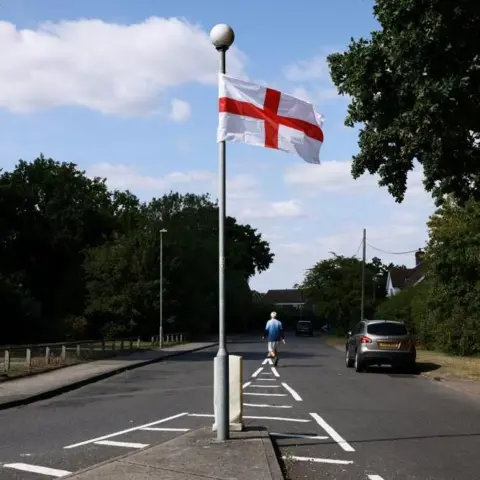 Reuters
ReutersDriving through the south west of Birmingham, it’s hard not to notice something about the lampposts.
For more than a mile, almost every one has a St George’s or union jack flag attached – thousands of them.
In one district, Weoley Castle, the BBC found two men carrying a ladder and shopping bags. A DIY trip this is not, because as we stop to talk to them one rests the ladder against a lamppost, the other pulls a union jack flag from the bag, and the next minute it’s flying high.
They tell us they want to spread “love, unity and patriotism”, but don’t want to be filmed or interviewed. They direct us to a local cafe where flags and donations are being collected to find out more.
It’s rare to see national flags lining our streets like this in Great Britain, beyond special occasions like royal, sporting or military events, so why are they appearing now – and does this say something bigger about people’s perceptions of modern-day Britain?
The latest phenomenon started in mid-July in Weoley Castle and spread to neighbouring areas. In the last week it has rippled not just across the West Midlands, but other parts of England including Worcester, Bradford, Greater Manchester, Newcastle and Norwich.
In the cafe, we’re told the first flags were put up in Weoley Castle’s square in response to a story in the nearby town of Rugby about a 12-year-old girl who was prevented from making a speech about being British in her school, while wearing a union jack-themed dress.
She was wearing the outfit for Bilton School’s “culture celebration day”, for which pupils were asked to wear cultural dress rather than school uniform. The school has since offered “unreserved apologies” to the girl over the incident.
As the story gathered steam online, a group named the Weoley Warriors was formed, locals told us in the cafe, initially by three men but now said to have several dozen members.
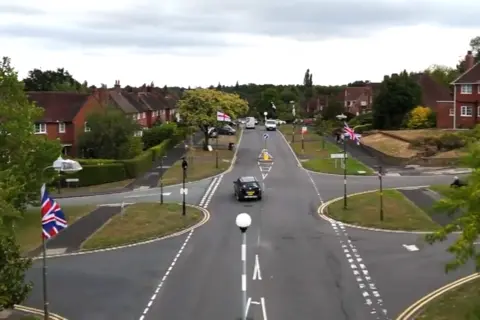
We know little about this group and who exactly is behind it. What we do know is that in the last few weeks, it has been prolific on social media with its bold lion-themed logo, mainly being shared by individual accounts. It has a private Facebook group of 1,600 members and has launched an online crowdfunder, raising nearly £14,000, which the group says will be used only “for flags, poles and cable ties”.
On the crowdfunder page, Weoley Warriors describes itself as “a group of proud English men with a common goal to show Birmingham and the rest of the country of how proud we are of our history, freedoms and achievements, giving hope to local communities that all isn’t lost and they are not alone”.
A TikTok account with the name Weoley Warriors has used the hashtag “operation raise the colours” in some posts, a phrase that many accounts are using alongside pictures of various flag locations.
“Operation Raise the Colours” is also the name of another group that has encouraged people to put up flags and is alleged to have accepted a donation from the far-right organisation Britain First, The Times reported. According to the research group Hope Not Hate, Operation Raise the Colours was co-founded by Andrew Currien, otherwise known as Andy Saxon, who has allegedly had links with the English Defence League and Britain First. The group denies it is a far-right organisation.
While the Weoley Warriors has focused activities on Birmingham, Operation Raise the Colours claims to have supplied flags to areas such as Wolverhampton, West Bromwich and Staffordshire. On Thursday in London’s Canary Wharf a large group of men, many masked, raised hundreds of flags in support of the campaign.
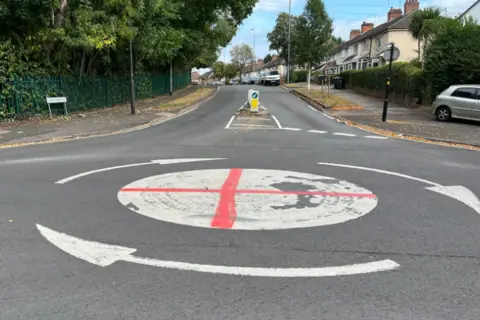
In some other areas, the raising of flags appears to be spontaneous, coinciding with a highly charged political time in the UK, particularly England, when it comes to national identity and belonging. There have been protests outside some hotels housing asylum seekers where union jack and St George’s flags have featured heavily among the placards.
There’s an ongoing legal battle over the closure of an asylum hotel in the Essex town of Epping, and more demonstrations are planned, where speakers often touch on themes of nationhood.
But the fact that both the St George’s and union jack flags have been used as emblems for far-right political movements, over many years, has meant some residents in Birmingham have been uncomfortable with the motivations of some of those backing the Weoley Warriors.
A man in the suburb of Kings Heath, where a roundabout was vandalised, said it was “not patriotic, it just feels like an excuse for xenophobia”.
Sarah Milne, who knows the original members of Weoley Warriors, tells us the idea behind it has been to show pride in the country and “to take the flag back from the racists”.
She believes it is part of a reaction to a general sense of malaise – “everybody’s so upset with the way the country’s being run, the way we’re being treated”.
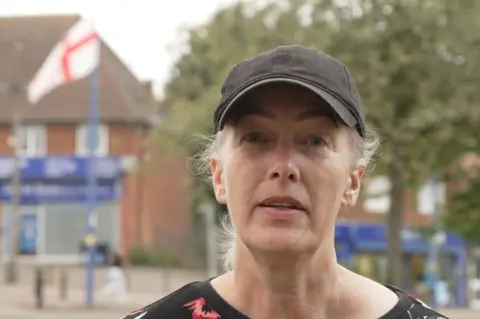
There has been no response from the Weoley Warriors after the BBC tried to contact the group multiple times via social media and the crowdfunder page.
All the locals we have chatted to in Weoley Castle support the flags, but for different reasons. Some say it’s about patriotism and civic pride, some talk about immigration while others point to Palestinian flags that, while far fewer in number, have long flown in other parts of the city.
The reaction six miles away in the flag-lined village of Barnt Green, Worcestershire, has been more muted with several people telling the BBC they are pleased about the flags but others expressing unease – one man fearing they might cause division.
It gets to the heart of how many Britons’ relationship with the union jack and the four nations’ flags is complex.
Sociologist and author Ellis Cashmore believes those displaying the flags probably have different reasons for doing so, but generally feel a sense of being left behind or overlooked. For some, the warnings of tax rises and economic pain potentially to come this autumn may be contributing to this sense of disillusionment.
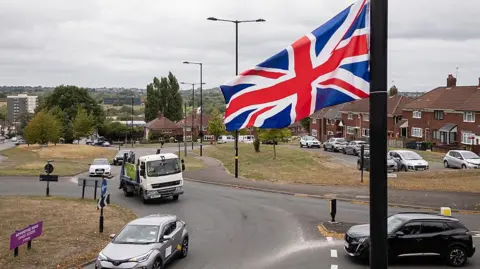 Getty Images
Getty Images“If people reach the conclusion that they’re being either silenced or ignored, they want to do something about it,” he tells us.
“Of course they don’t have the means to make a formal protest, so what do they do? They start sticking out these flags, waving them… They want people to pay attention to them.”
Those raising flags on lampposts in recent weeks have used mostly union jacks, but others – particularly those painting roundabouts and zebra crossings – have chosen the St George’s Cross, which symbolises the patron saint of England.
The St George’s flag has sometimes had a closer association with English nationalists, and the union jack has been used frequently by mainstream political parties including the Tories and Labour. Alongside these flags, you can currently see the Scottish Saltire, Welsh Dragon, and Irish tricolour on one of the busiest roads in Birmingham.
In Greater Manchester, where flags have begun to emerge too, mayor Andy Burnham told BBC Radio Manchester that “flags are contentious… especially the flag of St George”.
“I don’t think you need to start going out painting your community, you can obviously display a flag if that’s your choice but I don’t know, I do wonder about the times we’re living in,” he said.
“It’s like people are seeking confrontation.”
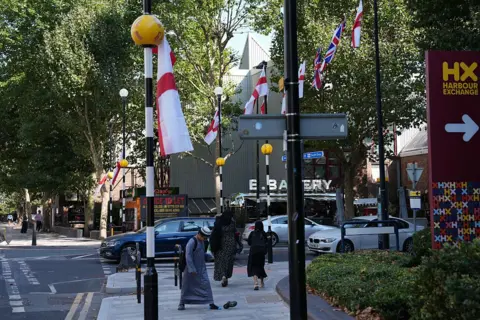 AFP via Getty Images
AFP via Getty ImagesIt echoes a warning from Dorset council’s leader Nick Ireland, a Liberal Democrat, who said on Friday that some residents were finding the St George flags appearing there “intimidating” and it was “naive” to suggest the emblems had not been “hijacked” by some far-right groups.
As a political row develops over the response to the flags and roundabouts, Tory leader Kemi Badenoch waded in on Saturday to say councils removing the flags on lampposts were behaving in a “shameful” way and applying rules “selectively”.
Rather than being seen as an “act of rebellion” such flags should be “welcomed”, she wrote in the Daily Mail.
Meanwhile, the Labour-run city council in Birmingham has been accused of leaving Palestinian flags up but taking St George’s and union jack flags down. Initially officials said the latter were a health and safety risk and would be removed. The council has also said only 200 flags have been taken down since the start of January and none since 1 August.
Many of the Palestinian flags in Birmingham have popped up sporadically, on only one or two lampposts rather than lining the streets. An exception to this was at the start of July when lampposts between the University of Birmingham and the Edgbaston cricket ground were bedecked with Palestinian flags – they were quickly taken down.
In a view that diverged somewhat from Burnham’s comments, another Labour mayor – Richard Parker of the West Midlands – said this week: “I’ve seen them, I agree that they are uplifting all of us… displays of patriotism are something I support, so that’s my position and I think that is increasingly the position of the councils in the regions and politicians from all sides.”
The police have got involved in some of the roundabout-spraying incidents, with West Mercia Police saying this week it was investigating it as criminal damage in Bromsgrove and West Midlands Police saying it was carrying out inquiries.
It remains unclear how long this will last. Will patriotic flags become a more permanent fixture of residential streets in Britain, like in many US neighbourhoods where they are commonplace?
As flag flying and roundabout spraying grew in Greater Manchester this week, Burnham asked people to “chill out” – something many seem to find easier said than done at the moment.
Additional reporting by Katie Thompson and Amy Johnston.

